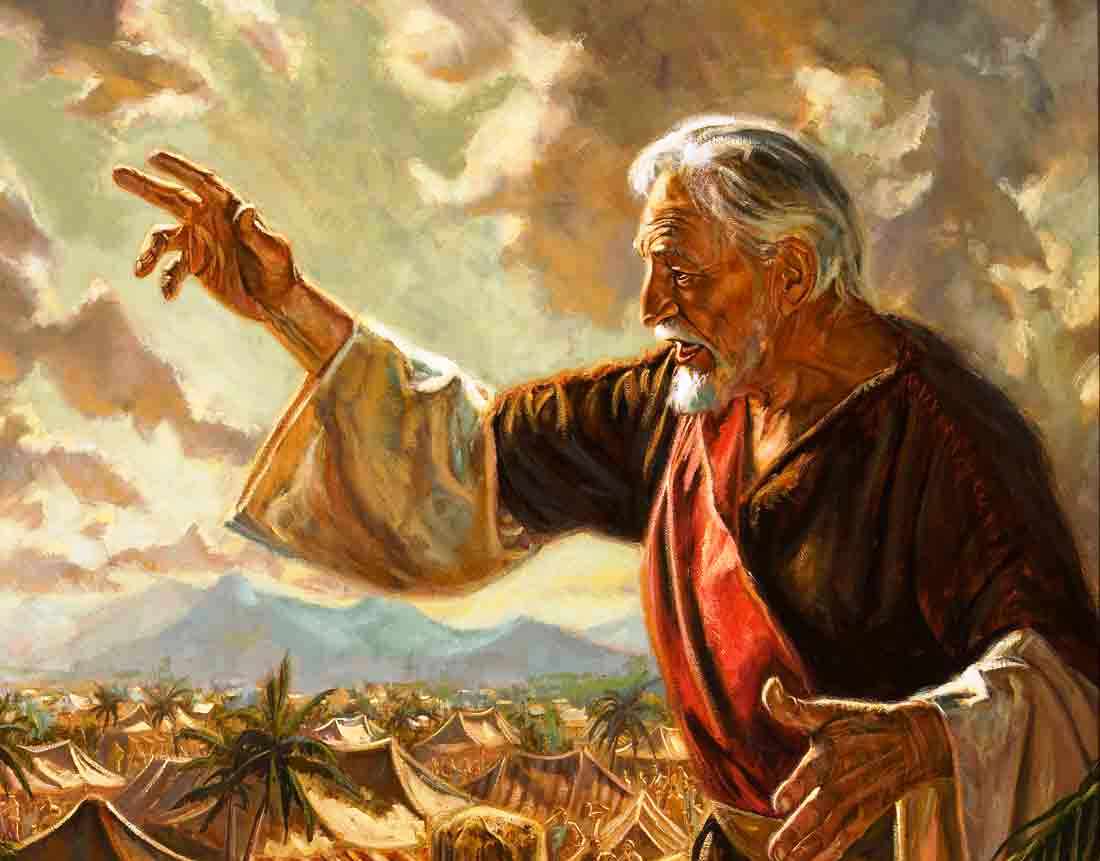To accompany your Come Follow Me study for April 22-28
In addition to reading Mosiah 1-3 this week, you will enjoy watching the following related videos:
You will also enjoy reading the corresponding chapter from the Book of Mormon Institute Student Manual at:
If you would like a Kahoot game related to this material which you could use for personal study or use with your family or your class, click here: https://create.kahoot.it/share/mosiah-1-3/6b6df6ef-e24c-467b-919d-49392a2457a4 . To use it with a group, after clicking on this link, you will need to log into Kahoot, creating a free account if you have not done so previously, then click on the blue “Start” button. Some of the Kahoot questions may presuppose that the player has read through the suggested answers to the following Points to Ponder and at least has browsed the Institute student manual as well.
Points to Ponder in Mosiah 1-3
1. Could we conclude from 1:4 that non‑English‑speaking Latter‑day Saints should view the learning of English as a religious obligation in order to better understand our modern scriptures? Should we feel a similar duty to learn Greek and Hebrew? Why or why not?

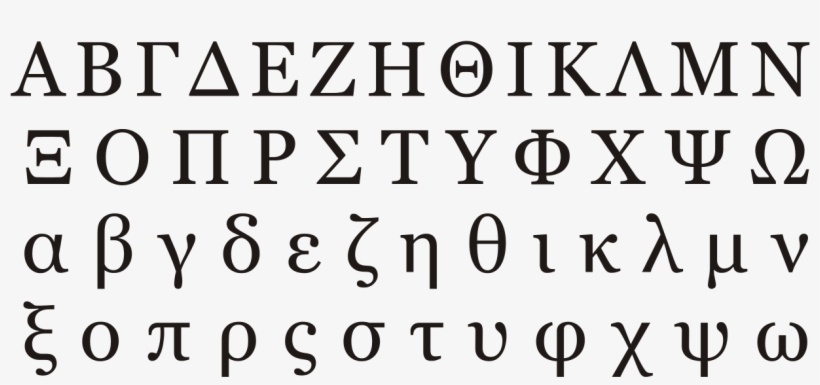
2. Why does Benjamin want his sons to know the “mysteries”? Don’t the prophets counsel us to leave the “mysteries” alone and concentrate on the basic principles which are fundamental to our salvation? (1:3, 5)

3. What does it mean to dwindle? (1:5) In what sense does one who fails to read the scriptures of today dwindle?

4. How does “searching” the scriptures differ from reading them, or even studying them? (1:7) Is your time with the scriptures more of a reading or a searching? If the former, what could you do to change your approach?

5. What do we learn about the size of the Nephite nation from the fact that in one day’s time Benjamin was able not only to notify but to physically assemble his entire country into one big meeting? (1:10ff)
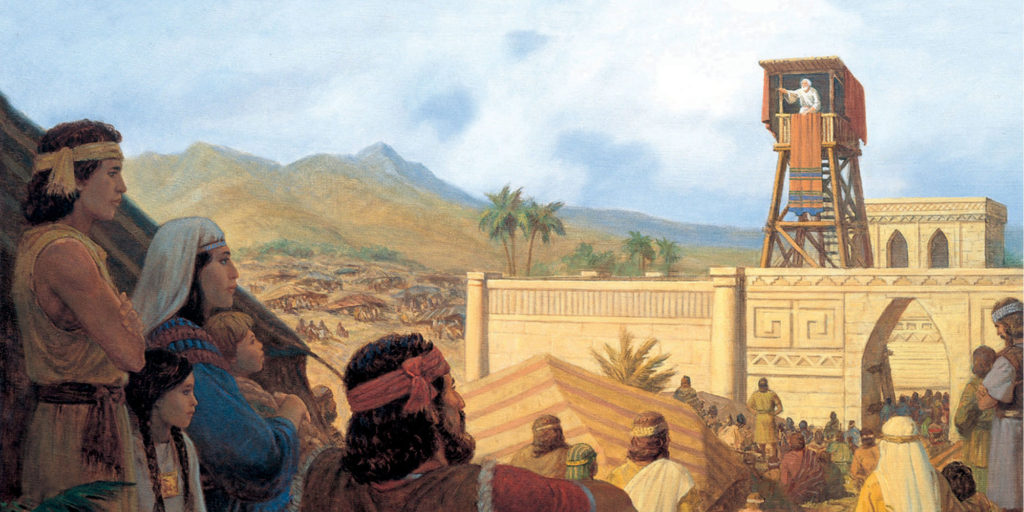
6. What does Benjamin mean when he says, “I shall give this people a name”? (1:11) What name was it, and how did he propose to give it?
7. Are “famine and sore afflictions” in general a sign that people have been slow to remember their religious duties? (1:17) Do you find that people become more religious or less religious when they are experiencing such problems?

8. Which is true: That those who love God keep his commandments (John 14;15), or that those who keep his commandments are blessed with love for God? (Mosiah 2:4) Is there a contradiction here?
9. Why did the Lord appoint “just men” to be teachers among the Nephites? Couldn’t the women teach just as well?
10. What are the modern-day equivalents of
a. The big meeting King Benjamin called in chapter 2?
b. The “tower” in 2:7?
c. The writing in 2:8?
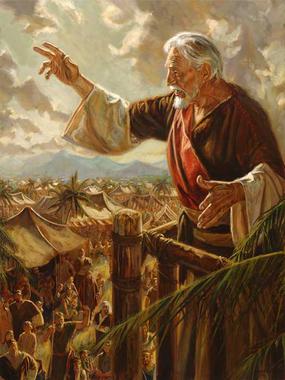
11. Is religion essentially a matter of the heart or of the mind? Which is more likely true, something which sounds logical but feels wrong, or something which feels right but sounds crazy? What does 2:9 have to do with this?

12. How would you feel about having the president of your country labor with his hands so that we wouldn’t be burdened with taxes, as Benjamin did? (2:14)

Jorge Cocco painting of King Benjamin
13. Accepting that it is true that when we are in the service of our fellow beings we are in the service of our God, is it also true that only when we are serving our fellow beings do we serve God? (2:17) What implications does this passage have for us that we may often overlook?
14. Hadn’t Benjamin ever heard about how important it is to have good self‑esteem? Didn’t he know that we are the offspring of Deity, with divine potential? Why does he keep emphasizing that men are worthless (4:5), less even than the dust of the earth (2:25), and that even if we spent all our time and energy in God’s service we’d still be unprofitable servants? (2:21)
15. If no matter what we do we can’t be profitable servants to the Lord, what’s the use of trying? (2:21, 34)
16. Can you reconcile Benjamin’s assurance (2:24) that the Lord immediately blesses us for each righteous deed with the seeming deprivation of many faithful saints who apparently must wait for the next life to obtain many of the blessings now enjoyed by their less faithful contemporaries? Does your answer square with 2:41?
17. If we were to attempt to follow Benjamin’s lead in ridding our garments of the blood of others (2:28), what specifically would we do in today’s society? How could we get an audience the size of Benjamin’s?
18. Are there really “choirs above” as 2:28 seems to suggest? What significance do you see in the phrase?
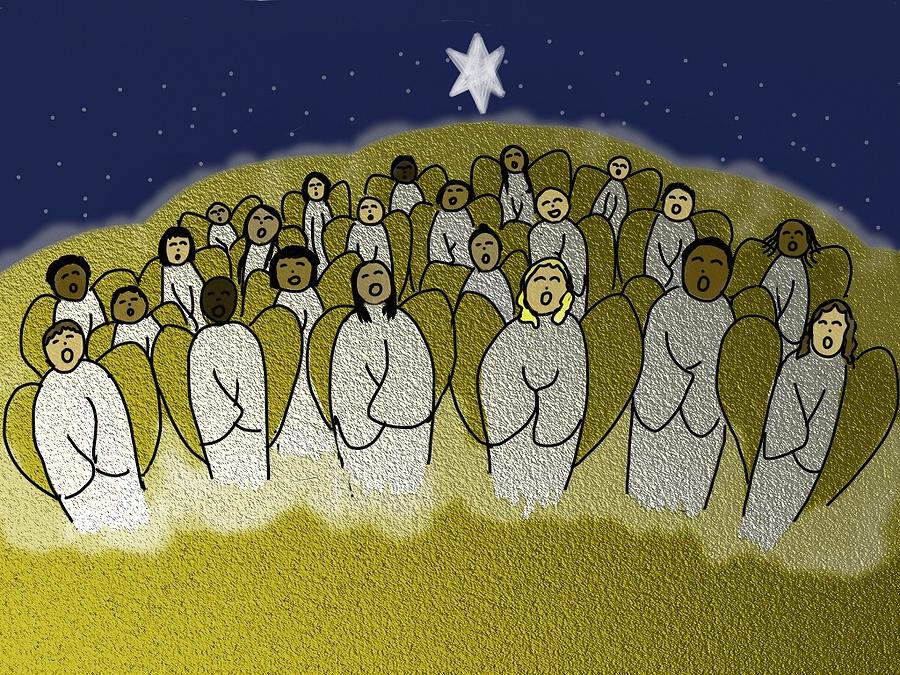
19. Many religions have traditionally taught of an eternal hell in which the wicked will suffer forever. Others don’t believe in a hell at all. Where do Latter‑day Saints stand on this controversy? Wherein do we differ from both of the traditional views? (2:38‑39; 3:25‑27)

20. What do you personally find most impressive about Benjamin’s prophecy concerning the coming of Christ in chapter 3?
21. In what instance(s) did Christ use power that is not available to the faithful Church member of today? (3:7) Did he thereby have things easier or harder? Explain.

22. What examples of ignorant sin come to your mind most readily? What real difference is there whether a person sins ignorantly or intentionally? Isn’t the effect the same? (3:11)
23. What do you see in the Church today that has the same benefit in our lives that the law of Moses did anciently? (3:15)
24. What does the following picture have to do with Mosiah 3:19?

25. What other analogy could you come up with to explain how “the natural man is an enemy of God,” whether he intends to be or not? (Mosiah 3:19.)
26. Although Benjamin said, “the natural man is an enemy to God” (3:19), Brigham Young said “the natural man is of God.” Who is right? Why the seeming difference?
27. How do you account for the fact that Book of Mormon prophecies of the coming of Christ, such as Mosiah 3, are much more specific and detailed than anything in the Old Testament?
POSSIBLE ANSWERS TO POINTS TO PONDER IN MOSIAH 1-3
1. Could we conclude from 1:4 that non‑English‑speaking Latter‑day Saints should view the learning of English as a religious obligation in order to better understand our modern scriptures? Should we feel a similar duty to learn Greek and Hebrew? Why or why not?
Non-English speakers in every country could well be advised to learn English, if only for economic reasons. Those who know English find jobs more easily and typically earn more. It could also be helpful for non-English speakers to learn English to better understand modern scripture and to be able to hear from the living prophets in their own language. However, in most cases it is not crucial that they do so for religious reasons, inasmuch as the essential Church materials have been translated into most of the other major languages of the world, unlike the situation which prevailed in Benjamin’s day. D&C 90:11 indicates that every man will “hear the fulness of the gospel in his own tongue,” not that he’ll have to learn another tongue.
Joseph Smith did study Hebrew and a little Greek. He said, “My soul delights in reading the word of the Lord in the original.” Similarly, Latter-day Saints could benefit from knowing Hebrew and Greek, but the benefit would probably not be sufficient in most cases to justify the time and effort it would take to learn those languages, which most consider more difficult to learn than English and have no comparable economic value in today’s world.
2. Why does Benjamin want his sons to know the “mysteries”? Don’t the prophets counsel us to leave the “mysteries” alone and concentrate on the basic principles which are fundamental to our salvation? (1:3, 5)
The word “mysteries” has various meanings. Certainly, we shouldn’t waste time on those matters on which the Lord has chosen to remain silent. But we should do all we can to understand as fully as possible what he has revealed, the substance of which will remain a mystery to all who do not carefully seek. The temple ceremonies, for example, will remain “mysteries” to those who do not qualify or choose to enter, but are freely available to all who choose to meet the entrance requirements. A full understanding of the temple, of course, may require a lifetime and more. President David O. McKay, as President of the Church, once said, “Every time I go to the temple, I learn something new.”
3. What does it mean to dwindle? (1:5) In what sense does one who fails to read the scriptures of today dwindle?
To dwindle is to gradually become less. That which becomes less when scriptures are not read includes faith, testimony, spirituality, excitement, and even one’s confidence in the use of scriptural language (such as is used in prayers).
4. How does “searching” the scriptures differ from reading them, or even studying them? Is your time with the scriptures more of a reading or a searching? If the former, what could you do to change your approach?
“Searching” the scriptures implies looking for something rather than merely plodding through them aimlessly. Such a search can be either a general alertness to discover anything of interest, value, or potential application, or it can be a search for answers to specific questions. One of my favorite approaches is to ask such questions as “What in these verses would make a good discussion question?” “What in these verses makes any difference to us today?” Or, “What principle is taught in these verses, and how can I better apply it?”
5. What do we learn about the size of the Nephite nation from the fact that in one day’s time Benjamin was able not only to notify but to physically assemble his entire country into one big meeting? (1:10ff)
The “nation” at this point clearly numbers at most in the few thousands, not in the millions, and is apparently spread over only a few dozen square miles at the most. Otherwise it would have been impossible to gather them all overnight. The fact that it was a belated discovery that not all could hear king Benjamin at the same time implies again that we are not dealing with hundreds of thousands.
6. What does Benjamin mean when he says, “I shall give this people a name”? (1:11) What name was it, and how did he propose to give it?
He proposed to give them the name of Christ by having the people become “born again,” which would include baptism, and being “adopted” by Him. It’s similar to how newly adopted mortal babies thereafter typically use the same surname as their adoptive father.
7. Are “famine and sore afflictions” in general a sign that people have been slow to remember their religious duties? (1:17) Do you find that people become more religious or less religious when they are experiencing such problems?
Sometimes yes to the first question, as Deuteronomy 7:11-16 as well as Mosiah 1:17 indicates, but no in other cases, such as Job’s. Sometimes famines and afflictions are caused by the evil deeds of others or come just in consequence of our living in a fallen world. While some people are hardened and driven from religion by afflictions, I personally believe more are softened and made more receptive.
8. Which is true: That those who love God keep his commandments (John 14;15), or that those who keep his commandments are blessed with love for God? (Mosiah 2:4) Is there a contradiction here?
No contradiction. Both statements are evidently true. It appears to be cyclical. Those who love God will keep his commandments, which brings the Spirit, which in turn fills the recipient with yet greater love, which will prompt even greater obedience, and so forth.
9. Why did the Lord appoint “just men” to be teachers among the Nephites? Couldn’t the women teach just as well?
Did we fool you on this one? The answer, of course, is that “just men” in this case means “righteous men,” not “only men.” I have no reason to think that “just” Nephite women didn’t help with the teaching, though given societal customs of the time they may well have done most of their teaching in the home rather than in public.
10. What are the modern-day equivalents of
a. The big meeting King Benjamin called in chapter 2? Perhaps general conference.
b. The “tower” in 2:7? Perhaps the satellite transmissions we receive.
c. The writing in 2:8? Maybe the Liahona magazine and the conference transcripts posted in the Gospel Library and at ChurchofJesusChrist.org.
11. Is religion essentially a matter of the heart or of the mind? Which is more likely true, something which sounds logical but feels wrong, or something which feels right but sounds crazy? What does 2:9 have to do with this?
According to 2:9, true religion has both
an intellectual and an emotional component.
One would do well to be wary of anything which either felt wrong or
sounded crazy, though the feelings may be a surer guide than the intellect for
the average person, provided he is worthy of the Spirit of the Lord.
12. How would you feel about having the president of your country labor with his hands so that we wouldn’t be laden with taxes, as Benjamin did? (2:14)
As every country’s population is many times larger than that of Benjamin’s, with vastly more complex challenges, it is probably impractical to think of having a part-time president or a government which could operate without taxes, though a president could still benefit from observing the principles of service, economy in government, and not asking anything of the populace which he would not be willing to do himself if time permitted.
13. Accepting that it is true that when we are in the service of our fellow beings we are in the service of our God, is it also true that only when we are serving our fellow beings do we serve God? (2:17) What implications does this passage have for us that we may often overlook?
Yes, it is difficult to think of anything which would constitute service to God which is not also a service to our fellow men. Some may overlook the fact that it is not sufficient to avoid doing evil, or even to “worship” God, study the gospel, fast, and pray, but that He expects us to serve him by performing works of active service on behalf of our fellow men.
14. Hadn’t Benjamin ever read about how important it is to have a good self‑concept? Didn’t he know that we are the offspring of Deity, with divine potential? Why does he keep emphasizing that men are worthless (4:5), less even than the dust of the earth (2:25), and that even if we spent all our time and energy in God’s service, we’d still be unprofitable servants? (2:21)
With God’s help, man does have divine potential. But without God, man is less than worthless–he becomes an enemy to God (3:19). It would be a mistake to encourage someone to feel good about himself while he was rejecting God. That would be like trying to convince a cancer sufferer that he didn’t need the doctor. But it is important to try to convince everyone that God does love them and that with His help they can become more than they ever imagined.
15. If no matter what we do we can’t be profitable servants to the Lord, what’s the use of trying? (2:21, 34)
Frenzied efforts to repay God commensurately for what He has done for us would surely be misguided, but that’s not the point of our service to him. The point is that by doing all we have the power to do, we demonstrate the faith that qualifies us for the blessings of the atonement.
16. Can you reconcile Benjamin’s assurance (2:24) that the Lord immediately blesses us for each righteous deed with the seeming deprivation of many faithful saints who apparently must wait for the next life to obtain many of the blessings now enjoyed by their less faithful contemporaries? Does your answer square with 2:41?
The best reconciliation seems to be that many “immediate” blessings are not recognized as such and may not always coincide with our short-sighted petitions. It is also true that the promise that the obedient will be blessed in “all things, both temporal and spiritual” is a general and collective promise which does not apply in the short run in every individual case, though it certainly will in eternity. For additional thoughts on the subject, see my article at https://latterdaysaintandhappy.com/keep-gods-commandments-prosper-why-are-so-many-good-people-poor/.
17. If we were to attempt to follow Benjamin’s lead in ridding our garments of the blood of others (2:28), what specifically would we do in today’s society? How could we get an audience the size of Benjamin’s?
We would try to make sure that we had been appropriately forceful and clear in sharing our testimony with those for whom we have specific responsibility–e.g., our families, our friends and neighbors, our ministering families, classes we may be assigned to teach, etc. Most of us do not have a stewardship the size of Benjamin’s, so there would be no need to assemble an audience the size of his.
18. Are there really “choirs above” as 2:28 seems to suggest? What significance do you see in the phrase?
Such passages imply that good music is a part of heaven, just as it is a part of appropriate worship.
19. Many religions have traditionally taught of an eternal hell in which the wicked will suffer forever. Others don’t believe in a hell at all. Where do Latter‑day Saints stand on this controversy? (2:38‑39; 3:25‑27)
We believe in a hell, but one which (1) features mental anguish and the pangs of a guilty conscience rather than physical torment and (2) one to which most individuals will go only temporarily. (D&C 19; 76.)
20. What do you personally find most impressive about Benjamin’s prophecy concerning the coming of Christ in chapter 3?
Your choice. I’m personally impressed with how detailed and clear Benjamin’s teachings on the subject are—far beyond anything found in our current Old Testament.
21. In what instance(s) did Christ use power that is not available to the faithful Church member of today? (3:7) Did he thereby have things easier or harder? Explain.
He used divine power unavailable to the rest of us only to remain alive through infinitely excruciating pain, a tiny fraction of which would have killed an ordinary man. In that respect, he had things much harder than the rest of us.
22. What examples of ignorant sin come to your mind most readily? What real difference is there whether a person sins ignorantly or intentionally? Isn’t the effect the same? (3:11)
Examples could include smoking and drinking or even violations of the law of chastity by a non-member, refusing to listen to the missionaries, or paying an incomplete tithing through a mathematical error. While the temporal effect might be the same, there is an enormous difference in the effect on one’s standing before God, who accepts the atonement as full payment for ignorant sin.
23. What do you see in the Church today that has the same benefit in our lives that the law of Moses did anciently? (3:15)
Examples could include Aaronic Priesthood assignments; the sacrament; religious pictures in our homes; temple ordinances; etc. All are intended to give us physical activities and temporal reminders of spiritual realities, in the hope that we will eventually get the spirit of what they represent.
24. What does the following picture have to do with Mosiah 3:19?
Perhaps the girl could represent a Church member. The boy in the white shirt could represent the Lord, and the one in the black shirt could represent the world. Too many of us want to be friends with both. Until we are ready to give our total devotion to the Lord, we are in a sense His “enemy.”
25. What other analogy could you come up with to explain how “the natural man is an enemy of God,” whether he intends to be or not? (Mosiah 3:19.)
Your choice. One possibility would be a disoriented football player who picks up a fumble and runs toward the goal line—but the wrong one! He thinks he is helping his team, but because he is unaware of which direction he should be going or is not listening to the coach on the sideline, he is actually at that moment his team’s “enemy.” Likewise, if we attempt to give a priesthood blessing, make a ministering visit, or teach a lesson without God’s inspiration, we could easily do more harm than good.
26. Although Benjamin said, “the natural man is an enemy to God” (3:19), Brigham Young said “the natural man is of God.” Who is right? Why the seeming difference?
This is just a semantic issue. Benjamin and Brigham Young are using the term
“natural man” to mean two quite different things. Benjamin uses the term to mean
“uninspired man.” Brigham
Young means that it is more “natural” to follow God than not to,
since we are children of God with a long pre-mortal history of following him.
27. How do you account for the fact that Book of Mormon prophecies of the coming of Christ, such as Mosiah 3, are much more specific and detailed than anything in the Old Testament?
Here are at least three possibilities:
a. Perhaps the Bible once had more specific references, which are among those “plain and precious” truths removed by the “great and abominable church.”
b. Perhaps the greater righteousness or preparation of the Book of Mormon peoples and/or of the latter-day readers of the book made it possible for the Lord to give more specific revelation on the subject to Book of Mormon prophets than to their Biblical counterparts.
c. Perhaps Joseph Smith was allowed sufficient leeway in translating the record to make it even clearer to us than it would have been if we had been reading the original language of the Book of Mormon writers.
